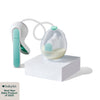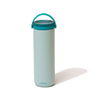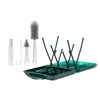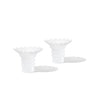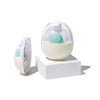Feeding your new baby is a big responsibility. According to Stanford Children’s Health, your baby grows more in the first year of life than any other time, which means it’s especially important to ensure your little one is getting all the nutrients they need. Queue the stress panic of — “am I doing this right?!” (You’re doing a great job, mama!)
With the amount of feedings, planning, and food options out there, it’s understandable if you’re feeling overwhelmed about baby feeding. We’re here for you. One thing that can help reduce that stress or worry? A feeding schedule. Just like you have those classic baby milestones, you can have a similar guide set out for feedings that will help your baby start good eating habits right from the get-go.
In this post, we’ll cover the first year of feeding schedules for your newborn, what they should be eating when, and some of the most common questions about baby feeding.
When Should My Baby Start a Feeding Schedule?
While there are a lot of should’s in baby development and baby care, keep in mind, a lot of these should’s can be a little flexible — every baby is different and your little angel is equally as unique. Which also means there’s no perfect time for when your baby should start a feeding schedule..
In the beginning, your baby’s needs are going to be inconsistent and it’s important to simply feed on demand, meaning whenever your newborn’s hungry, it’s time for a feed. Over time, feedings will become more regular and that’s when you can start to think about feeding schedules. There’s no perfect time frame, but many experts say you can start getting a more regular feeding schedule together between 2 to 4 months.
Breast Milk vs. Formula Schedules
While every baby will be a little different, generally, breastfed babies will need slightly more frequent feedings than bottle fed babies. Why? Because babies can digest breast milk quicker than formula, meaning they can refill sooner. When breastfeeding, they also may eat less at each feed than formula feeding, so they’ll need more frequent feeds.
One other difference between formula and breast milk is when coming directly from the breast, it’s much more challenging to measure exactly how much your baby’s actually eaten. With that in mind, it’s even more important to pay attention to your baby’s signals for when they’re hungry or full.
Newborn Feeding Schedules
In the first few months of your baby’s life, it may feel like schedules and routines are a thing of the past — all that’s left is exhaustion and diapers. Hang tight mama, this won’t last forever.
For the moment, the feeding schedule is going to be loose. Exactly how loose depends on the type of feeding you’re doing (breast feeding, exclusive pumping, or formula), how you personally function as a human, and what your baby needs.
One thing is certain for your baby at this point in life: they are not on solid foods. Feed your newborn breastmilk or formula. Those are your two options. Introducing other foods will come in time.
Sample Newborn Feeding Schedule (0-3 months)
|
Age |
Sessions per day (Breastmilk) |
Time Per Session |
Sample Time Schedule |
|
0-2 months |
8-12 or every 2-3 hours |
~15 minutes |
7 am |
|
2-3 months |
6-8 feedings or every 3-4 hours |
~15-20 minutes |
7 am |


